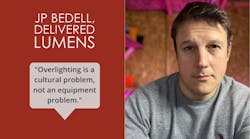DarkSky teams with global cities association to fight light pollution
A few weeks after DarSky International criticized slow progress in the world’s fight against light pollution, the advocacy group has teamed with an international lighting association of cities to address the problem.
Tucson, Ariz.–based DarkSky is collaborating with LUCI (Lighting Urban Community International) “to minimize light pollution for all living beings,” DarkSky CEO Ruskin Hartley said in a press release announcing the partnership.
Based in Lyon, France, LUCI counts 67 cities from the around world as its members, in addition to 50 “associated members” from the ranks of vendors — Signify, for example — plus research groups, universities, designers, artists, festival, exhibitions, and other lighting-related outfits.
LUCI endeavors to bring together local authorities “that sustainably use light as a tool for social, cultural, and economic development.”
It runs five working groups, one of which is Light Pollution. The others are Health and Well Being, Placemaking with People and Light, Light Festival, and Small and Mid-sized Cities. Common goals among many of the groups include lighting cities for public safety, for activities and recreation, and for bringing people together, all while minimizing harmful effects of lighting including light pollution.
In 2023 LUCI issued what it called a Declaration for the Future of Urban Lighting which aimed at multiple themes. The declaration implored cities to find a “new harmony between light and darkness in the city.”
DarkSky is now working with LUCI to foster that challenge.
“For DarkSky, achieving this harmony is crucial,” Hartley said. “The relentless growth of our cities has only been matched by their rapid brightening, extending hundreds of kilometers into the hinterlands…. Integrating sustainable lighting practices is vital to any city’s sustainability plan. Many cities are now setting ambitious targets to reduce greenhouse gas emissions, conserve water, and ensure all residents can access parks and green spaces. However, access to natural darkness and quality urban lighting must also be part of this sustainability conversation.”
Hartley reiterated the importance of applying DarkSky’s “Five Principles”: Use light only if needed, shield it from spilling outside the target area, keep levels low, use controls to turn levels off or down when appropriate, and use warm hues that avoid blue spectra.
“By following the Five Principles for responsible outdoor light at night, cities can promote quality urban lighting that reclaims the stars,” he said.
DarkSky, formerly called the International Dark-Sky Association, works to prevent light pollution, which bleaches out the view of stars and replaces dark skies with “skyglow” — created in populated areas when scattered outdoor light bounces back to Earth after hitting clouds and particles.
Less than two months ago, in an annual overview of the state of light pollution, DarkSky noted that the world has a long way to go counteract light pollution.
“Scientific studies suggest the overuse of artificial light at night is the main source of light pollution yet the functional efficacy of outdoor lighting remains extremely low,” it said in the June 4th report, entitled “Artificial Light At Night: State of The Science 2024.”
Follow our LinkedIn page for our latest news updates, contributed articles, and commentary, and our Facebook page for events announcements and more. You can also find us on the X platform.

Mark Halper | Contributing Editor, LEDs Magazine, and Business/Energy/Technology Journalist
Mark Halper is a freelance business, technology, and science journalist who covers everything from media moguls to subatomic particles. Halper has written from locations around the world for TIME Magazine, Fortune, Forbes, the New York Times, the Financial Times, the Guardian, CBS, Wired, and many others. A US citizen living in Britain, he cut his journalism teeth cutting and pasting copy for an English-language daily newspaper in Mexico City. Halper has a BA in history from Cornell University.








![The DesignLights Consortium continues to make progress in shifting outdoor lighting products and implementation practices toward a more restrained and thoughtful strategy. [Image does not represent a DLC qualified fixture.] The DesignLights Consortium continues to make progress in shifting outdoor lighting products and implementation practices toward a more restrained and thoughtful strategy. [Image does not represent a DLC qualified fixture.]](https://img.ledsmagazine.com/files/base/ebm/leds/image/2024/08/66be810888ae93f656446f61-dreamstime_m_265700653.png?auto=format,compress&fit=&q=45&h=139&height=139&w=250&width=250)
